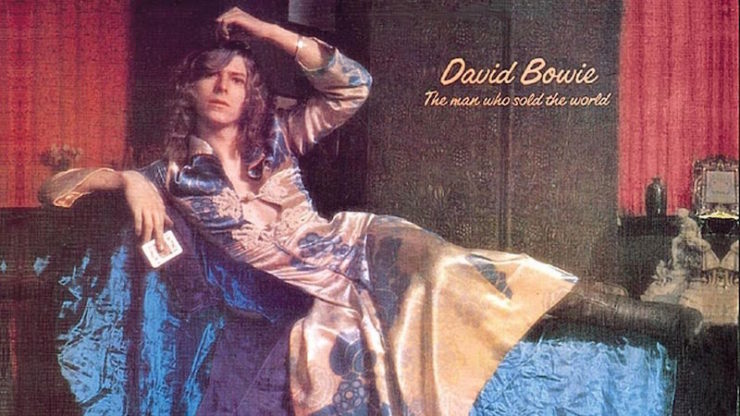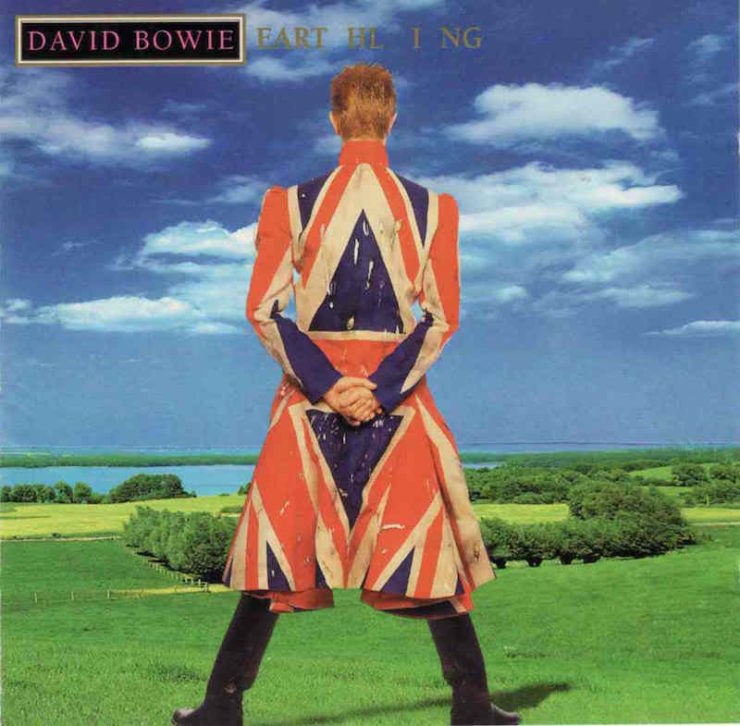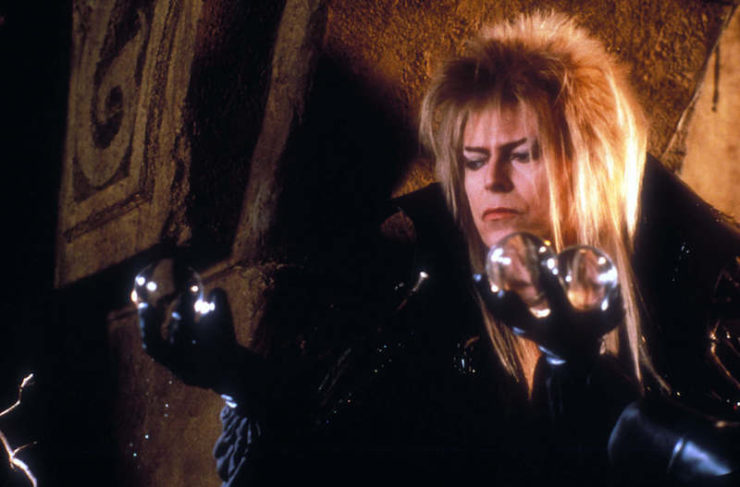There is only one explanation for David Bowie: He was actually a wizard who attended Hogwarts.
Observe:
David Bowie was born in 1947 in Brixton, South London. According to your average (muggle) history books, he attended Stockwell Infants School, then Burnt Ash Junior School, and then ended up at Bromley Technical High School following his eleven-plus exams in 1958. While Bowie was reportedly in a band as early as the age of fifteen, his career as a musician didn’t truly begin until 1967, when he began releasing singles with a slew of different bands that he joined and then departed. He then proceeded to become one of the most widely acclaimed rock stars of the 20th century, whose penchant for reinventing himself was nothing short of magical.
I have a theory. Hogwarts is real. David Bowie attended it. And he’s one of the few graduates to achieve such marvelous success outside of the wizarding world.
Okay it’s more of a joke than a theory, but then you start thinking about it…
Being born in London, England means that he certainly would have been eligible for a Hogwarts education. He also would have been born after all the mess with Grindelwald and Dumbledore fighting while World War II was ablaze. This means that he would have potentially attended Hogwarts from 1958-1965, roughly two school generations removed from Harry’s parents. Interestingly enough, here is a description of Bromley Technical from Bowie’s biographer Christopher Stanford:
Despite its status it was, by the time David arrived in 1958, as rich in arcane ritual as any [English] public school. There were houses, named after eighteenth-century statesmen like Pitt and Wilberforce. There was a uniform, and an elaborate system of rewards and punishments.
That… sounds like Hogwarts. Of course, that in and of itself is not remarkable—Hogwarts was based on the structure of boarding schools in England. But it was apparently a strange thing for a technical high school (being state-funded rather than privately owned) to carry these traits. So perhaps that whole thing was just a quick cover for the sake of a biography, and David Bowie was not going to Bromley Technical at all. Instead, he got his Hogwarts letter, and headed off to Scotland with all the other magic kids.

You should also know that Peter Frampton went to Bromley a few years behind Bowie, and his dad was an art teacher there. (If you think I am suggesting that this school was an elaborate front, and that Peter Frampton was also a wizard and that his dad taught magic choir at Hogwarts, you are correct, I am saying that exact thing.)
Emily, you reply, voice full of patience. This is not anywhere near enough evidence to suggest that David Bowie was a wizard. We’re pretty sure we would have heard something to that effect if he were doing concerts for muggle and magic folk alike. Plus, his name is pretty distinctive.
Ah, but what if it wasn’t always?
Because Bowie wasn’t the man’s original name. In fact, his given name was David Jones, a name he decided to change when it kept getting confused with Davy Jones of The Monkees (apparently, no one thought to confuse him with Davy Jones of sea legend, which seems remiss). And Jones is a name that wizards know quite well:
- Hestia Jones: A bonafide member of the Order of the Phoenix.
- Gwenog Jones: Captain of the Holyhead Harpies
- Megan Jones: A half-blood Hufflepuff in Harry’s year at Hogwarts.
Jones is a very common British surname, and so it would seem to be a fairly common wizarding surname at well. Even with longstanding wizarding lineage, Bowie could have easily been a half-blood with plenty of muggle family members, making sense of why he might have continued to straddle the line between both worlds professionally.
If he’s a member of the same family that little Megan is (maybe a cousin’s kid?), then there’s a good chance that he was also a Hufflepuff. Although, frankly, he was probably an epic hat-stall during the Sorting: the tenacity of Gryffindor, the curiosity of Ravenclaw, the ambition of Slytherin, the ability to work with many different types of people like a Hufflepuff.
Either way, this wizarding education might help to explain a few of Bowie’s early career decisions—the muggles thought it was all about messing with gender norms when the cover of The Man Who Sold the World featured Bowie with long hair wearing a frock, but some of the more isolated wizards clearly only wear robes (sans trousers) in their day-to-day activities.

So for Bowie it was probably just normal, and the reactions he got among non-magic folk were baffling, to say the least. From there, he moved on to space-age wear, seeing as it went with the concept of his concept album. It’s a safe bet that the magic community was baffled by those first few records… with references to things like space and Khalil Gibran (wait no, he was probably a wizard too) and drive-ins and cigarettes. His band was called Ziggy Stardust and the Spiders From Mars (Wait, but what if Aragog’s species did originate on Mars? What if all spiders come from Mars and wizards are the only ones who know it?) and even for a world full of whomping willows and paintings that talk, Bowie’s music must have seemed like something truly unique, truly mind-blowing.
Of course, you all know what this means: Sirius Black was a huge fan.
Think: The Marauders were at Hogwarts from 1971 to 1978, the perfect Bowie-window for impressionable young minds. Ziggy Stardust and Aladdin Sane, Station to Station, the Berlin trilogy were all happening in that period. A rock star from their alma matar who was doing brand new things by both wizarding and muggle standards would appeal to them, and Sirius would be the most likely to glom onto him as yet another way of upsetting his pureblood family. This means that Sirius Black wore glitter and jumpsuits on Halloween and was probably the worst Bowie karaoke singer at your local bar. (The Hog’s Head Inn?) James Potter probably loved this.
David Bowie’s “chameleon” capabilities could also point to metamorphmagus talents! As a performer, he seemed to have no difficulty becoming someone else entirely, and if you can already do that on a magical level, doing it on a more mundane one probably isn’t such a big deal. Oh, and then he married Iman! Who is definitely a wizard. (Did she go to Uagadou? Was she an exchange student at Beauxbaton? Is she part-veela, like Fleur Delacour? Probably all of the above and more?)
During the second war against Voldemort, Bowie was in an industrial rock phase that makes even more sense if you account for the turmoil going on in the wizarding world. His albums 1. Outside and Earthling could have served as veiled commentaries on what was going on at the time. The title track of Earthling contains words about fear and “Earthlings on fire.” The song “Battle for Britain” (telling enough title as it is) contains the lyrics:
Don’t be so forlorn,
it’s just the payoff
It’s the rain before the storm
Don’t you let my letter get you down
Don’t you
When asked what the song was actually in reference to, Bowie reportedly said that he had no intention of explaining what event inspired the lyrics. So the whole thing could be read as a shoutout to bolster magic folk while the war raged on. It seems like the sort of song that Lee Jordan would blast on their resistance radio station, for sure. Hell, there’s a song called “Dead Man Walking,” which reads like an autobiographical account… but what if it was meant to be a song about Albus Dumbledore’s final months? He was a effectively a dead man walking for Harry’s entire sixth year.

Look, I am just saying there are a lot of metaphors available here and none of them are telling me that David Bowie is not a wizard, so that probably means that he is one.
Duncan Jones, his son, is a film director with a couple of interesting movies under his belt, including Moon and Warcraft. So the real question is… did he also inherit magic genes? Or is he a squib who channeled his talents elsewhere? (The latter is a nice thought, since all squibs can’t be as bitter and disturbing as Argus Filch.) Alexandria, his daughter with Iman, is probably in her last year at Hogwarts right now, though—so look out, world.
The point is that I am very certain that David Bowie went to Hogwarts because it is too much fun to think about and we should all agree that this is our reality from now on. For the good of magic and music… which are essentially the same thing anyhow.
Emmet Asher-Perrin does not spend her afternoons thinking of all the ways to place David Bowie into every story she’s ever read, so stop saying she does that. You can bug her on Twitter and Tumblr, and read more of her work here and elsewhere.











That’s…well, actually that would explain a lot.
Dance, magic dance …
I can’t think of any obvious reasons why you’re wrong…
Dude to the right of him in school photo has a smug Tom Riddle look and vibe…
This is the sort of expose that gets one zot by any mind wiping magic. Well done. I plan on remembering it for as long as I can. :D
If my chronology is correct, he would have been working on Scary Monsters right at the height of Voldemort’s attempt to seize power, and Let’s Dance would essentially be his response to Voldemort apparently being destroyed by his attack on baby Harry. I’m sure those could be made to fit nicely into this theory.
@6: Let’s Dance probably falls closer to the end of the Crouch tribunals and the start of attempts to bring repentant Death Eaters back into the fold, but that fits with the theme of the song/album and thus further reinforces the theory!
Yeah, he’s a Hufflepuff, like Tonks. That’s the house all those that later have multicolored hair are in :-)
What the hell happened to him during his Station To Station period?
Brilliant analysis and entertaining too.
Now you have me looking at every British performer in an entirely new light. LOL
this is delicious and wonderful
when Alan Rickman died just a few days after Bowie last year— good lord was it only last year?— i imagined a rich backstory wherein Snape revered Bowie’s music, and how it was inextricably entangled with his love for Lily Evans. some of what i wrote about it ended up here.
I love him to pieces, but he is clearly Slytherin. With Ravenclaw as secondary. He has commentary on that haircut in one of his biographies. He had a troubled youth and no one really understood him. I think Hogwarts would have been a welcome respite.
“But it was apparently a strange thing for a technical high school (being state-funded rather than privately owned) to carry these traits.“
No, it wasn’t. I was at a state-funded secondary school in the 1970s where we had houses (named after Elizabethan explorers) and uniforms. Uniforms were compulsory at ALL the local secondary schools. The reason for school houses is nothing to do with arcane hierarchy but an arbitrary way to separate the entire school into four groups for the purposes of school games and competitions.
No mention of his occult leanings, or the fact that he practiced Crowley style magic? Or was that too on the nose?
Yes, Sirius Black was the biggest Bowie fan at Hogwarts. He had enormous arguments with James Potter, who was more into the Stones. Remus Lupin thought Warren Zevon was The Man. And then there were all those Ravenclaws listening to ELP and Yes.
It must be asked: was Stubby Boardman a Bowie fan? Even did covers, maybe? :)
Then there’s his curious dip into acting with Labyrinth and Twin Peaks: Fire Walk with Me.
Think about it. Labyrinth occurring in 1986 just when Harry, the Boy who Lived, is growing up. Perhaps, hoping against hope that Harry’s relatives would let him see the film and be fascinated by magic and be inspired by the young girl who fought her way to the castle at the center of the goblin city. Perhaps also, it was a subversive way to release his tensions by acting the part of a magical bad guy just after the magical bad guy of his world was gone.
Then there’s Twin Peaks: Fire Walk With Me which is all about darkness and death and despair (but if you know the very tail end of the film there’s this incredible amount of light). It came out in 1992 just when Harry is attending his first and second years at Hogwarts. For some, there was these little insinuations that Voldemort was back and things were going to get dark again. But, as someone who probably looked up to the tenacity and artistic flair of someone like Albus Dumbledore (someone who never cowed to anyone’s ideals of standards) maybe believed that Voldemort was back too and wanted to do something about hope, about darkness seemingly winning, about the freaky leeching into the normal (he probably foresaw some of the later actions of the death eaters even then). He also allied himself with another wizard–David Lynch has to be an Ilvermorny alumnus–to do such a film. And to do a film with someone so subversive and reminding him of the subversive Dumbledore, even the better.
I always thought Bowie was Azor Ahai
This theory explains so much, I love it. It explains this early single from Mr Jones.
It’s well known in Certain Circles that Headmaster Jones is quite alive and well, thank you very much, and settling in nicely to his new career, following his retirement from Muggle life.
Now do an article about Prince and Ilvermorny!
What about his animated appearance as a shape-shifter in The Venture Bros. series? I know it is merely a cartoon with a voice actor who is not David Bowie, but someone obviously knew and was trying to tell the world something. I know the cartoon hints at the shape-shifter being Bowie’s friend that took Bowie’s form from time to time, but maybe that’s only what they want us to think…
Guess that explains “Letter to Hermione” as well?